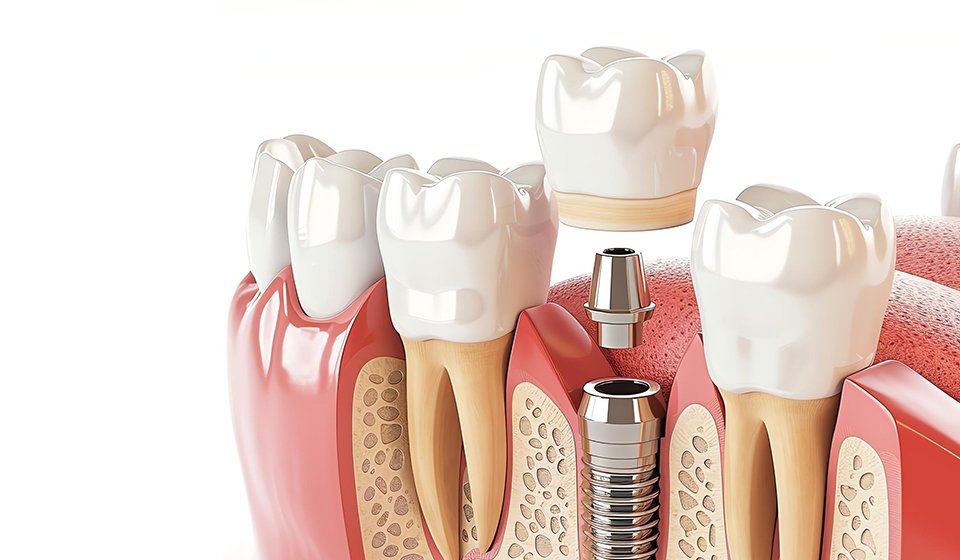Losing one or more teeth can have a significant impact on your overall oral health, appearance, and quality of life. Fortunately, modern dentistry has provided a revolutionary solution in the form of dental implants – a remarkable treatment that can restore your smile’s functionality, aesthetic appeal, and confidence.
In this comprehensive guide, we’ll explore the world of dental implants, their benefits, the process, and what you can expect from this transformative procedure.
What are Dental Implants?
Dental implants in Houston,TX, are artificial tooth roots made of titanium or other biocompatible materials. They are surgically placed into the jawbone, where they fuse with the surrounding bone over time, creating a sturdy foundation for a replacement tooth or a set of dentures.
The implant acts as an anchor for a custom-made artificial tooth crown, bridge, or denture, providing a natural-looking and long-lasting solution for missing teeth.
Benefits of Dental Implants:
- Improved Appearance: Dental implants are designed to mimic the look and feel of natural teeth, restoring your smile’s aesthetic appeal and boosting your confidence.
- Enhanced Functionality: Unlike traditional dentures or bridges, dental implants function like your natural teeth, allowing you to eat, speak, and smile without the fear of slippage or discomfort.
- Preserved Jawbone Health: When a tooth is missing, the surrounding jawbone can deteriorate over time due to lack of stimulation. Dental implants help preserve the integrity of the jawbone by providing the necessary stimulation, preventing further bone loss.
- Long-Lasting Solution: With proper care and maintenance, dental implants can last for decades, making them a highly durable and cost-effective solution in the long run.
- Improved Oral Health: Dental implants do not require alteration of adjacent teeth, as is the case with traditional bridges. They also make it easier to maintain proper oral hygiene, reducing the risk of gum disease and tooth decay.
The Dental Implant Process:
- Initial Consultation: Your dentist will evaluate your oral health, discuss your treatment goals, and determine if you are a suitable candidate for dental implants.
- Surgical Placement: During the first surgical procedure, the implant post is precisely placed into the jawbone. This is typically an outpatient procedure performed under local anesthesia or sedation.
- Healing and Osseointegration: After the implant placement, a healing period of several months is required to allow the implant to fuse with the surrounding jawbone, a process known as osseointegration.
- Abutment Placement: Once the implant has integrated with the jawbone, a second minor surgery may be required to attach an abutment (a connector piece) to the implant.
- Restoration Placement: The final step involves attaching the custom-made artificial tooth crown, bridge, or denture to the abutment, completing the restoration process.
What to Expect:
While the dental implant process may seem lengthy, the benefits of a successful implant procedure far outweigh any temporary discomfort or inconvenience. Most patients report minimal pain and swelling after the surgeries, which can be managed with over-the-counter medications.
It’s essential to follow your dentist’s post-operative instructions carefully, including maintaining excellent oral hygiene and attending follow-up appointments to ensure proper healing and integration.
With proper care and maintenance, dental implants can provide a lifetime of service, restoring your ability to eat, speak, and smile with confidence.
Conclusion:
Dental implants by Unident Family Dentistry in Houston,TX, are a revolutionary solution for missing teeth, offering a range of functional, aesthetic, and health benefits. By understanding the process and what to expect, you can make an informed decision about whether dental implants are the right choice for restoring your smile and improving your overall quality of life.
If you’re considering dental implants, consult with a qualified and experienced implant dentist who can guide you through the process and tailor a treatment plan to meet your specific needs and goals.











